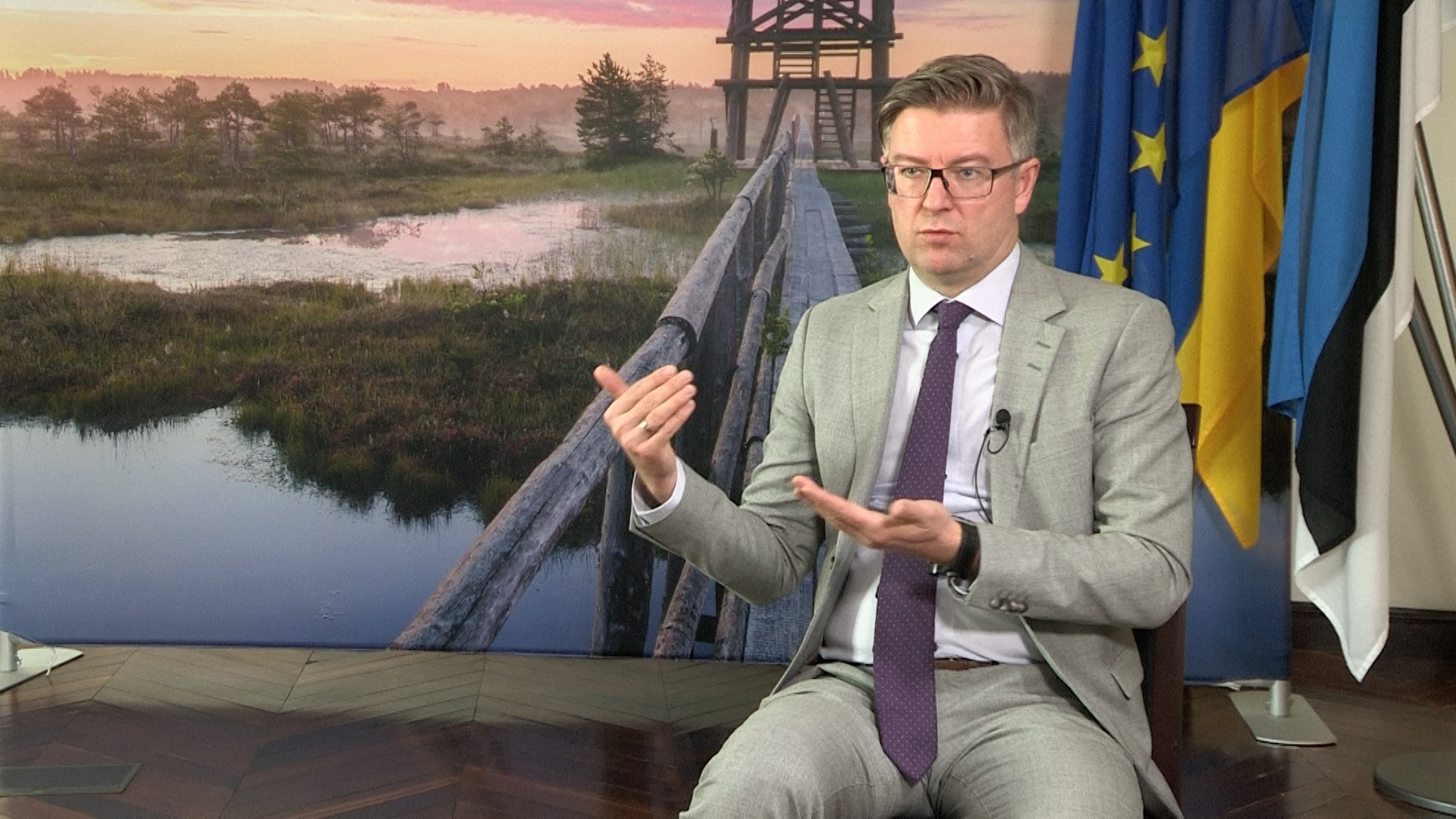Years ago, such cooperation of the West with the USSR prolonged the economic existence of the Soviet empire. Today this history is reflected in the Nord Stream 2 project. Sanctions are a good instrument to contain the aggressor. In order to use it effectively, Ukraine should not wait while the West will do the work. Ukraine should proactively supply its allies with information about physical persons and legal entities to be covered by their sanctions.
Estonia understands the value of a non-recognition policy. Non-recognition of the Soviet annexation of Baltic States allowed Estonia to quickly find a decent place in Europe after the restoration of its independence. Estonia understands the danger of cooperation with an aggressor on gas supply.
This is the story Kaimo Kuusk, Ambassador Extraordinary and Plenipotentiary of the Republic of Estonia to Ukraine, told the Center for Journalist Investigations. It was recorded by Yulia Kazdobina, analyst, the head of the Ukrainian Foundation for Security Studies, and Mykyta Panasenko, journalist of the Center.
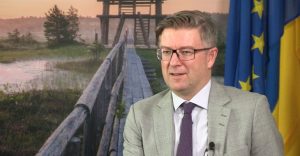
Julia Kazdobina: Mr. Ambassador, thank you very much for this opportunity to talk to you about Crimea and Crimean sanctions. And also, to thank you for the support that we as Ukrainians feel from Estonia basically all the time. And the first question is about the Crimea Platform. We know that Estonia took part in the inaugural summit and your President supported it very actively promoting it among European leaders. So, what is your view of the results of the Crimea Platform summit? Do you think the Declaration sounds strong enough, do you think it sounds decisive enough?
Kaimo Kuusk: The Crimea Platform is very important and it’s a really good idea and initiative from the Ukrainian side. In Estonia we consider it a success. Forty six countries and international organizations participated at the high level. From Estonia our President was here, the Minister of Defense was here and also Parliament members took part. So, basically all the [government] levels took part in this event here.
Our President went to Kherson the day before the Crimea Platform. We visited the administrative line with Crimea. She was the first Head of the state who actually visited the administrative line with Crimea which is a little bit surprising for me.
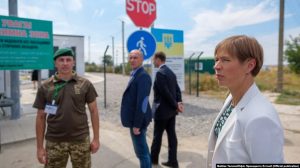
Annexation and war is going on in eastern Ukraine for the eighth year. We think the declaration was very good as well. Actually, it stated the main aim and it is the deoccupation of Crimea. And it also stated that the participating states and international organizations consult with each other, work together with each other to find ways to end this occupation.
Plus, we stand together for international law whether it is on the soil or on the sea. So, for us that was definitely a good event and a good initiative.
Mykyta Panasenko: How do you see the further work of the Crimea Platform in the future?
Kaimo Kuusk: That’s a matter of cooperation. Just some weeks ago we had a really unique visit of high-level state officials to Ukraine. Eight ministries, general secretaries and the state secretaries. In Kyiv we had several meetings. With the President’s advisor on foreign relations, with the head of the Security Council, Deputy Foreign Minister, different ministers, the Minister of Defense, we also touched the Crimea Platform substance.
We stressed that the Platform shouldn’t be an event of summits. We need concrete actions and we need to work together on that. Yesterday I was participating with several ambassadors in a meeting at the Crimea Platform office and we started to discuss our further work. What would be next steps, what would be next projects?
Anton Korynevych, Ukraine’s President’s Special Representative to Crimea, led the event and he is a good guy. I believe that he can pull it off. So, it’s very important to use the momentum, put the wheel spinning and keep the wheel spinning on that matter.
Mykyta Panasenko: Is Estonia planning to hold any events within the framework of the Crimea Platform?
Kaimo Kuusk: We have offered as an idea that we could contribute more for example with experts on international law. We have really good experts in that field. But we will see whether this will be needed. But anyway, Estonia's NGOs are taking part, parliament members are active, government ministries, the Foreign Ministry and we as embassy are here as well.
So, from Estonia different levels have been engaged. I will not give any promises here. Let us work together with Anton and the other Ambassadors and, when we are ready, announce this project and another one, then later we will come up with others. I don’t want to surprise Anton here like that.
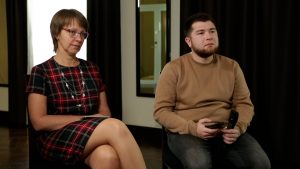
Julia Kazdobina: Russia's reaction to the summit was very negative and you probably remember that the Ukrainian Ministry of Foreign Affairs didn’t even announce all the participants before the start of the summit because they did not want Russia to exert pressure on the future participants. Did Estonia feel any kind of pressure and, if so, what form did the pressure take and how did Estonia react to it?
Kaimo Kuusk: We have to admit that we are used to Russian pressure. The Russian Ambassador in Tallinn made a statement and reached out to our Foreign Ministry with a warning that for the states that participate in the Crimea Platform there will be consequences.
Well, it’s not Estonia who broke international law, it’s Russia. So, as I said, we have been under pressure already for thirty years after we got our independence back. Russia punished us for our wish to be free. They put double duty taxation on Estonia in the nineties already. We had sustained cuts in oil, petrol and gas deliveries. So, we are used to their pressure.
We stand for international law and we definitely support states, democratic states who are under foreign aggression. So, for us, it’s a matter of honor to stand by Ukraine, to stand together with the Crimean Tatars.
When I came here two years ago, I had a meeting with Crimean Tatars and they gave me as a symbolic gift a copy of a Soviet KGB report from 1989 which described Crimean Tatars’ demonstration where they showed solidarity to Baltic states and Estonia. It was commemoration day of deportation of Estonians. We didn’t know that in those days because the Soviet mass media was censored. But to learn even afterwards that there were nations that were under threat themselves but they supported us, they were on our side. It’s important.
Julia Kazdobina: May we ask a question about Nord Stream 2 pipeline. What’s Estonia’s view of the current situation and the rising gas prices? Ukraine had warned everybody that this was going to happen. So, what’s the view from Estonia?
Kaimo Kuusk: Estonia has looked as this project all the time as a political one. We think it was not worth to start it, but we are not operating it at the same time.
I am strongly against the statements we sometimes hear from the West that gas deliveries were OK already during the Soviet times and that the Soviet Union, Moscow, Russia were a trusted partner in those days. We from Estonia say no, it was not like that. They weren’t a trusted partner. They were the occupying force for us. So, buying gas from the Soviet Union in those days probably prolonged our occupation in Estonia by 10 years. Or by more than 10 years.
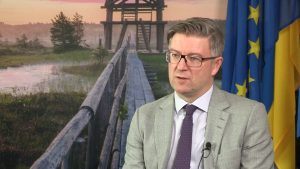
So, we think states should have a possibility to switch to different sources of energy as quickly as possible. That would be beneficial for all of us. So, I think Ukraine is doing sufficiently well. For example, even if you will lose the gas transit, your IT sector is already contributing several times more to Ukraine’s GDP than the gas transit.
Mykyta Panasenko: The EU sanctions on Crimea have been in place for more than 7 years. Mr. Ambassador, how do you assess their effectiveness?
Kaimo Kuusk: Everybody is assessing it constantly. How are the sanctions working? And as much as we know, they are working. Look at the persons who are under sanctions and companies under sanctions. How much energy they are putting to avoid those. This is already an indication that the sanctions are troublesome for them. Some people also say "but well, they have not ended the occupation." But I can argue that sanctions have been able to deter aggression from going even further.
Sanctions have a deterrent aspect to make the other side think about what can even follow if they make another wrong step.
Mykyta Panasenko: How in general is it possible to influence the behavior of the Russian Federation?
Kaimo Kuusk: Well, there are different possibilities. The spectrum is wide, starting from diplomatic means. Estonia has been for almost two years an elected member of the United Nations Security Council. The work there is really important. To draw attention to the Crimea issue, we have organized an Arria meeting at the Security Council. Our goal was to bring international attention to the things which are happening there. That the standard of life has got much worse there over the last seven-eight years.
Also, there are definitely possibilities to pursue the matter in international courts. And I think Ukraine is doing rather well on that and I admire your Foreign Ministry’s brains, actually. That’s a good team working there.
Sanctions are an important tool and every state is using them in their toolbox, and we in Estonia as well. Sanctions are a precision strike weapon. You need to hit very precisely towards those who have done bad things.
There's also one more thing: we need to improve our security. But that’s a deterrent part already. It deserves a separate, deeper discussion.
Julia Kazdobina: Another question was about Estonia’s policy towards Russia. What are the priorities of Estonia’s policy towards Russia and how are you achieving them? You’ve talked about the toolbox countries use. Estonia is a small country, Ukraine is a big country but we are not that strong economically, so we share this to a certain extent. So, how do you use that toolbox, what are the priorities and how are you achieving them?
Kaimo Kuusk: It’s a good timing to talk about priorities. Several weeks after the “Zapad” military exercise where Russia trained to attack the West, including Estonia, one of our previous Prime Ministers, I think it’s Siim Kallas, said that now is the best period of our relations with Russia than any time for the last five hundred years because Russia is not occupying us.
We would like to have normal relations with Russia, as we have normal relations with other neighbors like Finland, Latvia, Sweden. We don’t like this "toxic normality" that Russia is actually creating for us. But, well…
Estonia is a compact country whose foreign relations are always connected with security matters. So our priorities at the moment are COVID-related, we try to ease the movement for the people who live in Russia but have connections to Estonia. It’s not easy, but with the vaccination passports we try to make these kinds of things smooth.
So, the relations are rather basic, I have to say. The only way is to move upwards, but it depends so much on Moscow, I can’t see any break through in a short- or mid-term perspective. And, as an optimist, I would not even mention the long term one. We should have some communication. I know this is not a dialogue. More or less this is two monologues at the same time. But still, if possible, it's to have contact with Russia.
Julia Kazdobina: Well, that’s good that there is contact, right, because while you are talking hopefully you are not fighting.
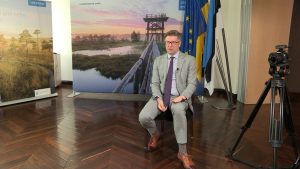
Kaimo Kuusk: Well, in that sense I am not very optimistic. You have to prepare for different scenarios.
Julia Kazdobina: And another question was about non-recognition policy. The European Union and western countries pursue a non-recognition policy towards the attempted annexation of Crimea. So, what’s the essence of this policy, what does it mean and do you think maybe it needs to be formalized or codified or is what we have currently enough?
Kaimo Kuusk: Well, there is always room to improve in the matter of coordination but the essence is that we don’t recognize the annexation of Crimea and the occupation. We insist that Crimea and the part in eastern Ukraine belongs to Ukraine. So, if we think how this is reflected, starting from maps, for example. Not just maps in the academic world in the schools but in everyday life as well. Those parts should be reflected as belonging to Ukraine. They are. Just at the moment reaching there is very limited.
That also means that I as the Ambassador to Ukraine should cover Crimea. We are not covering it from Moscow as Moscow is suggesting. In that respect this corner of Ukraine is in a sad and bitter situation because no one guarantees our diplomatic immunity there, so we cannot travel there. But we can definitely meet people who are coming from there here in Kyiv. We can even reach to Kherson if we know in advance and meet them there.
So, it's symbolic things and practical things. And symbols in the world, as you know very well, are really important. So, those will shape the future as well.
For us in Estonia, for the three Baltic states, it was really-really important during the Soviet occupation that the West did not recognize our belonging to the Soviet Union. We were occupied. So this helped us to restore the relations, restore our legacy very quickly after 1991 when we got our independence back.
Julia Kazdobina: should there be any more practical measures? Like people, politicians from other countries visiting Crimea, making public appearances. We know that no Estonian politicians visited Crimea but as a matter of principle, should there be any punishment or any specific measures against those people who travel to Crimea and make public appearances, make public statements that Crimea is actually Russian territory. What should be done about that?
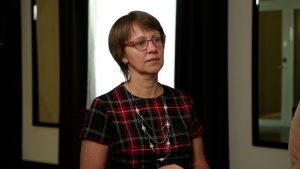
Kaimo Kuusk: Again, this is about coordination. Condemning, definitely. Ukraine can do its work here. It is its territory. It is its laws that those foreigners are breaking. They are crossing its border and violating its border-crossing laws, basically. So, in that sense, I think Ukraine is doing right things, following it and sanctioning those as well.
The rest of the countries can ban or not let tourist companies do their routes to Crimea or fly there directly. That’s very important. Including trade, for example. You cannot trade with Crimea directly. You should come through Ukraine if there are possibilities and needs and the Ukrainian government sees that as possible. So, that’s coordination, I guess the exchange of information can always be better.
Julia Kazdobina: Would it be helpful if the Ukrainian government provided this kind of information about violations to your government, other governments? Should there be any cooperation? Or is this already happening?
Kaimo Kuusk: It’s already happening. I think we can ourselves think how we can better remind people, to give people the information that "hey, keep in mind that this part of Ukraine is occupied, don’t violate the Ukrainian law." It’s very human not to pay attention, forget about things. Suddenly you can appear to be in a situation when you don’t even know what to do.
We have an example, not related to Crimea, but to the occupied territories in Donetsk and Luhansk Oblasts. Some Estonian citizens visited their relatives in those territories going through Russia and not realizing that it’s prohibited, that they are breaking the law of Ukraine. And when the COVID broke out and all the borders were closed, Russia closed the border to Donbas, they were in trouble and they started to seek help how to get out. Well…
So, I don’t wish people to be in such a poor situation. Can we blame them? Well, as I said, it’s very human not to pay attention and thinking that the whole Europe is as safe as inside the European Union or majority of Ukraine territory. Yeah. It's actually not.
Mykyta Panasenko: Does Estonian law provide for liability for violation of sanctions? What measures are applied?
Kaimo Kuusk: Yes, exactly. Breaking international sanctions, the EU sanctions which are compulsory for Estonia to follow, breaking those sanctions the person can be fined or imprisoned for five years. So, it’s a rather serious thing. I don’t advise anybody to break the sanctions.
Mykyta Panasenko: Have there been cases of punishment for violation of Crimean sanctions?
Kaimo Kuusk: Not as far as I know. No imprisonment. There have been cases concerning some companies. Some gray situations where Estonian institutions are investigating to see whether there has been taking place breaking of the law and what measures should be applied.
Julia Kazdobina: Could you talk a little bit about the way Estonia implements the EU sanctions. From what I understand, the system is that the EU imposes them jointly and then each country has to implement them at their own domestic level. So, how does it happen and how does this work?
Kaimo Kuusk: I don’t want to guess about the others but in our case, it’s coordinated through the Ministry of Foreign Affairs and there are separate institutions that are taking care of the sanctions in their field. So, if it’s for example, freezing the assets in bank accounts, there is the financial intelligence unit in Estonia that takes care of that field. If it’s the travel ban, it’s the police and the border guard who take care of this field of sanctions. So, we have shared the responsibilities through the institutions in Estonia.
Julia Kazdobina: And if this is a limitation on trade operations, if there is a ban on trading with Crimea?
Kaimo Kuusk: It’s police and border guard in cooperation with the customs, so that’s the Finance Ministry. Maybe, the Ministry of Economy as well, but the border guard and customs are the ones who are dealing with that.
Julia Kazdobina: Does Estonia conduct its own sanctions policy or do you just implement the European Union and the UN sanctions?
Kaimo Kuusk: We have our own national sanctions policy as well. For example, if you think of Belarus and what happened there, like the harsh violations of human rights, for example, then we can implement our own sanctions or together with other Baltic states.
But in case of sanctions what matters is that the more countries implement them, agree with them, the better. Not only the European Union actually but together with the United States and their Treasury, Canada, Japan, Norway which is not in the EU, for example, and Ukraine, obviously. The more countries join them, the more efficient they are.
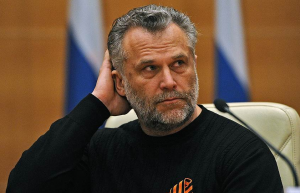
Mykyta Panasenko: It’s a big question. Company AS Tavrida Electric Export. Its office is in Estonia. It’s a part of the Russian group of companies Taurida Electric, and the founder of this company is the “people’s mayor of Sevastopol” Oleksiy Chaly.
Julia Kazdobina: There is this company that opened its office in Estonia and one of its co-founders is on the US sanctions list. So, the question is, isn’t it banned? Or is there anything that should be done about it? About a company affiliated with a person on the sanctions list having its office in Estonia. And they opened it in 2003 and in 2014 it was there and it’s still there.
Kaimo Kuusk: I am not aware of this concrete person or concrete company or concrete issue. We are definitely following or our institutions should follow if there is information that somebody is violating the sanctions. If this information is coming to the Estonian Embassy, we are passing it to Tallinn, to particular [government] institutions and they will take care of that. Analyze it, gather additional information and then measures will be taken, I am pretty sure.
Julia Kazdobina: So, would you be interested in more information on this case if the Center for Journalist Investigations passes it to you? Will you forward it to your officials in Estonia?
Kaimo Kuusk: Well, I welcome information 24/7. Information is most valuable resource. Why am I saying 24/7? Now we are getting into the culture classics of Estonia. There is a figure from Estonian literature. A schoolmaster, who worried about payments for schoolboys studies. He then said, that he is "ready to take the money 24/7." So, I am paraphrasing it – I am ready to take information 24/7.
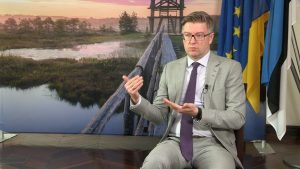
Julia Kazdobina: and probably the last question and it’s about the Estonian diaspora in Crimea. There is a pretty big community. Has it been affected by the occupation? What’s happening with the Estonian community in Crimea?
Kaimo Kuusk: They are somewhat landlocked there. As I said, we cannot go there to support them because nobody guarantees our security in a normal way as it should be in the diplomatic world, it’s the occupied territory. And we are not covering it from Moscow either, because Crimea is Ukraine. So we have been in little contact with them, saying that the Embassy is here in Kyiv, we are their counterpart. If they need help, we can reach in their direction until the administrative line in Kherson.
Julia Kazdobina: But do you keep in touch with them?
Kaimo Kuusk: We have, as much as the communication is possible through the Internet means. But it’s not very active, I have to admit.
Mykyta Panasenko: In your opinion, in general as a resume of this interview, How to make sanctions on Crimea, both Ukrainian and international, more effective? What should Ukraine do? Maybe, to monitor the situation in Crimea, form the list of sanctioned people and provide this list to Europe and the United States?
Kaimo Kuusk: Once again, this is the exchange of information and coordination. I think the Crimea Platform gives a structural possibility to share the information, providing the background.
It’s not enough when somebody says that everybody knows that somebody owns something or trades with something. You cannot use this kind of information, not in court. Persons in the European Union can turn to court and say hey, I’ve been mistreated, I am not guilty. There is a similarly named person, exactly the same name, he is the evil guy, but I am the good one.
Sanctions are a serious thing. The information collected should be very-very precise and double checked as well. So, these kinds of things Ukraine and the EU can definitely improve. Quicker reaction from the European Union side, if Russia is making some new steps. Another move, another mass arrest of Crimean Tatars. Or making another round of the so-called elections.
In that context I should say that in Russia there have not been elections for the last 30 years. There have been nominations of persons into different posts or into parliament. But not elections free and fair.
I guess what we from the European Union can do, we should react more quickly. So if there is a wrong move, there are consequences for the one who did this. Ukraine should use all the resources to provide the information, because they have the best access. Ukrainian institutions are not bad at all.
Mykyta Panasenko/Julia Kazdobina: Mr. Ambassador, do you think the Crimea Platform could be instrumental for liberating Crimean Tatars currently held as political prisoners in Crimea? Or how can it be instrumental for that purpose?

Kaimo Kuusk: Crimea Platform itself - no. We are not going to the gates of Lefortovo, for example, the forty six of us and opening the gates. That’s not happening. Some things may take quite a long time, as the occupation of Estonia lasted more than four decades, for example. The Crimea Platform can be used to pay attention to these cruel actions of the occupying power.
And this is definitely what the Crimea Platform should do, to keep this on everybody’s mind: the country you are trading with, the country you let the major sports events take place, for example, the country where you spend your vacation is arresting people on falsified accusations, torturing them in the 21st century. For that the Crimea Platform is definitely a needed tool.
Julia Kazdobina: thank you very much for this unique perspective from the Baltic countries. Here in Ukraine everybody has this urgency, we need to do something about it. And you have this experience you don’t wish anybody to have, but you have it, and you can talk from that standpoint.
Kaimo Kuusk: I can understand this feeling when something bad is happening and you cannot immediately do something. It’s like in school against the person who is bullying you. You can be so irritated but if you are not physically strong and you are alone there is no need to try to punch him because then you will be severely damaged. Join the karate club, organize some friends, cooperate with them, and be prepared. So it’s the strategic patience thing that we have learned. Don’t ever get used to the situation. Do not give up!
Julia Kazdobina: thank you.
Read More:
- Triple disconnection: how Russia seeks to destabilize Ukraine’s gas, electricity, and coal markets
- “Moscow regards concessions as a sign of weakness,” says Ukrainian civil society ahead of Biden-Putin call | Open letter
- The possible invasion is not the real issue. Russia’s new wave of destabilization needs a three-dimensional approach
- A coffee seller and an entire village family: who are the three detained Ukrainians Russia’s FSB arrested as “spies”
- Militants of Russia-controlled “republics” in highest battle readiness, Ukraine intelligence says
- Ukraine will become NATO member when three capitals change their views, Foreign Minister says
- An ultimatum in any language: experts on Russia’s demand that NATO not expand

